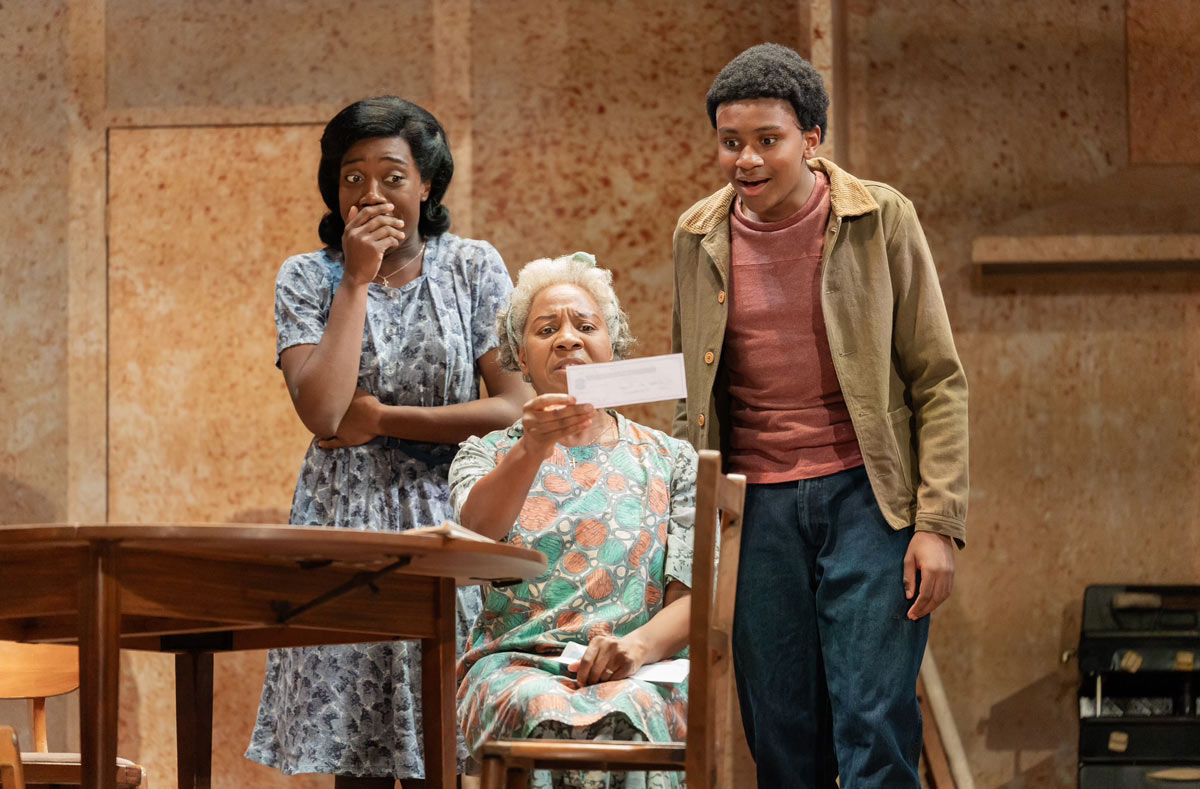Review: A RAISIN IN THE SUN at Lyric Hammersmith
Written in the late 1950s and set in south Chicago, A RAISIN IN THE SUN depicts The Youngers, a black family who live subject to the racial and class barriers of the time and who have recently lost the patriarch of the household. When his life insurance policy pays-out $10,000, it offers the chance for new beginnings, but not everyone in the family has the same ideas about how to spend the windfall.
 Cash Holland, Doreene Blackstock, and Adiel Magaji in A Raisin in the Sun at the Lyric Hammersmith - Photo credit Ikin Yum.
Cash Holland, Doreene Blackstock, and Adiel Magaji in A Raisin in the Sun at the Lyric Hammersmith - Photo credit Ikin Yum.
Some would argue that the societal restrictions which applied back then (both segregation and in relation to reduced opportunity for non-whites to access financial services), have changed little, and there is considerable data to support such a view. Certainly one irrefutable thing to change directly as a result of this play, was that a black woman writer’s name — Lorraine Hansberry — appeared on a billboard outside a Broadway theatre for the very first time.
The play’s title is drawn from Langston Hughes’s poem “Harlem” and the original 1959 Broadway production included a young Sidney Poitier and an even younger Lou Gossett Jr in the cast.
Harlem (Langston Hughes, 1951).
What happens to a dream deferred?
Does it dry up like a raisin in the sun?
Or fester like a sore — and then run?
Does it stink like rotten meat?
Or crust and sugar over — like a syrupy sweet?
Maybe it just sags like a heavy load.
Or does it explode?
For the Lyric Hammersmith, director Tinuke Craig has assembled and rehearsed a cast which possesses the easy familiarity and connectedness necessary to bring such a domestic drama to life. In an ensemble piece such as this, there are usually weak links, but for a long-ish play, it never slackens nor grows wearisome. The character set-ups are crisply realised early on as family members vie with each other and other residents of the tenement, to take their turn in the shared bathroom. Ruth (Cash Holland) prepares breakfast for her sleepy son and harries her husband Walter (Solomon Israel) to get ready for work. His sassy younger sister Beneatha (Josephine-Fransilja Brookman) is also up and waiting to take her turn and she uses the moment to reproach Walter for disparaging his work as a driver of white folks and instead assert his plans to use the money to set up a liquor store with unreliable acquaintances, a plan which his mother Lena (Doreene Blackstock) has already said is against her god-fearing principles. As his obsession with the money and its potential to establish him in business (his dream deferred) consumes him, he cruelly rebukes the women in his family - particularly his wife Ruth whom we learn is pregnant but considering an abortion due to Walter’s perpetual coldness and contempt, especially when he has been drinking.
When the mail man eventually arrives and the cheque is a tangible reality someone is sure to be disappointed, but it is the expression of trust in her family (even if it may prove ill-judged) which eventually guides Lena’s use of the money. Woven in amongst the central theme, Hansberry wrote nods to cultural assimilation through Beneatha’s plans to be a doctor and her scenes associating with two very different suitors - George (Gilbert Kyem Jnr) the college son of the only notably wealthy black family in the neighbourhood who just wants a pretty unthinking girl on his arm and Joseph Asagai (Kenneth Omole) a Nigeria intellectual who is in touch with his African roots and wants Beneatha to become the best woman she can be and to follow her dreams, perhaps one day returning with him to practise medicine in Nigeria. As a concerned white resident, Karl (Jonah Russell) has the thankless task of being the sole Caucasian voice in the piece. His attempts to sway the family’s decision making whilst repeatedly referring to them as “You People” in two significant scenes, neatly encapsulates the polite face of racism which has soured the American Dream throughout that nation’s history.
Despite being written just shy of 70 years ago, this terrific ensemble piece has lost none of its sharp observational edge, and in the hands of the excellent cast and creative team assembled here, demonstrates why A RAISIN IN THE SUN is considered one of the truly great plays of American drama.
Plays until 2nd November.
The running time is 3 hours including a 20 min interval.
Latest News

 Review Round-Up: PARANORMAL ACTIVITY at the Ambassadors Theatre
18 December 2025 at 12:25
Review Round-Up: PARANORMAL ACTIVITY at the Ambassadors Theatre
18 December 2025 at 12:25

 Review: CHRISTMAS DAY at Almeida
17 December 2025 at 13:57
Review: CHRISTMAS DAY at Almeida
17 December 2025 at 13:57

 New London Theatre shows to look out for in January 2026
17 December 2025 at 10:31
New London Theatre shows to look out for in January 2026
17 December 2025 at 10:31

 Indian Ink at Hampstead Theatre Review
16 December 2025 at 16:41
Indian Ink at Hampstead Theatre Review
16 December 2025 at 16:41